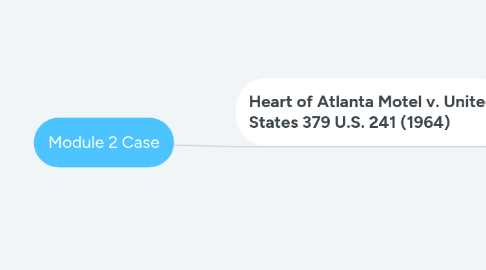
1. Heart of Atlanta Motel v. United States 379 U.S. 241 (1964)
1.1. Facts
1.1.1. Parties
1.1.1.1. Heart of Atlanta Motel
1.1.1.2. The United States of America
1.1.2. What Happened
1.1.2.1. The Heart of Atlanta Motel refused to rent rooms to African Americans
1.1.2.1.1. The Motel is readily accessible to 2 interstate and 2 state highways
1.1.2.1.2. The motel maintained over 50 billboards and highway signs throughout the state
1.1.2.1.3. 75 percent of the motel's guests were from another state
1.1.2.1.4. The motel followed a practice of refusing to rent to African-Americans prior to the passage of the Civil Rights Act, and intended to continue to do so
1.1.2.2. Congress passed the Civil Rights Act of 1964, prohibiting racial discrimination in "establishments affecting interstate commerce"
1.1.3. Procedural History
1.1.3.1. Federal district court ruled against Heart of Atlanta Motel
1.1.3.1.1. The Civil Rights Act is not unconstitutional
1.1.3.1.2. The Heart of Atlanta Motel is prohibited from denying service to people on the basis of skin color/race
1.1.3.2. Appeals court upheld district court ruling
1.1.3.3. Heart of Atlanta Motel appealed to the United States Supreme Court
1.2. Issue
1.2.1. Whether the activity sought to be regulated is ‘commerce which concerns more States than one’ and has a real and substantial relation to the national interest.
1.3. Rule of Law
1.3.1. Article I, Section 8 of the US Constitution, "The Commerce Clause"
1.3.1.1. Regulation of commerce within the states requires that the commerce substantially affected commerce involving more than one state
1.4. Analysis/Application
1.4.1. The Motel argued that it does not engage in interstate commerce
1.4.1.1. The court found that by serving interstate travelers, the motel is subject to the power granted to Congress by the Commerce Clause
1.4.2. The Heart of Atlanta Motel argued that Congress exceeded its constitutional authority to regulate commerce
1.4.2.1. The court found that discrimination by hotels and motels caused obstruction to interstate commerce
1.4.2.1.1. A Congressional act to remove this type of obstruction is well within its authority
1.4.3. The Motel argued that the Civil Rights Act violated the Fifth Amendment by taking private property for public use without just compensation
1.4.3.1. The court found that the owner was not deprived of liberty or property under the fifth amendment by losing the "right" to select its guests free from government regulation
1.4.4. The Motel argued that the Civil Rights Act violated the Thirteenth Amendment by forcing involuntary servitude
1.4.4.1. The court decided that this argument was so insubstantial that it required no further discussion
1.5. Conclusion
1.5.1. Appellate Court decision affirmed
1.6. Impact
1.6.1. Decision cited in case Twitty v. Vogue Theater Corp. 242 F.Supp. 281
1.6.2. Decision cited in case United State of America v. Martignon 492 F.3d 140
1.7. Importance
1.7.1. If the court had invalidated the civil rights act, discrimination would have remained legal, the ramifications on business and law today would be astounding
1.7.2. Additionally, a reversal would have resulted in a general weakening of congressional power to regulate intrastate commerce
1.8. Influence
1.8.1. In general, businesses today do not make policies with the intent to discriminate
1.8.2. Many businesses have diversity and inclusion policies, that may never have existed if this case was decided on differently

